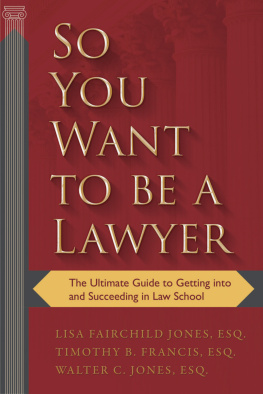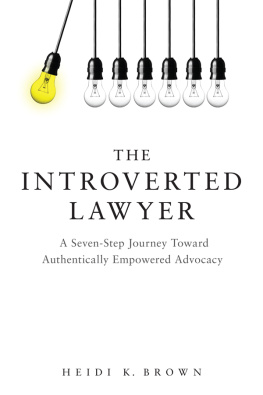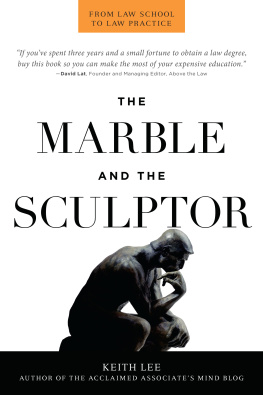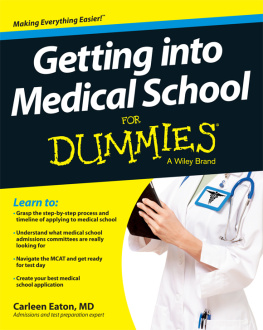Copyright 2012, 2017 by Lisa Fairchild Jones, Esq., Timothy B. Francis, Esq., and Walter C. Jones, Esq.
Foreword 2012 Ronald Mason, Esq.
Foreword to the New Edition 2017 Michael Andrew Fitts, Esq.
The fact pattern is a work of fiction. It is not meant to depict, portray, or represent any particular gender, real persons, or group of people. All characters, incidents, and dialogue are products of the authors imagination and are not to be construed as real. Any resemblance to actual events or persons, living or dead, is purely coincidental.
The legal principles, statements, and legal conclusions set forth in this book are offered for the purposes of teaching only and should not be construed as binding statements of law.
THE ANATOMY OF A CRIME: THE FACTS are taken from the screenplay Ivy League, Copyright 1992 and Still Waters, Copyright 1993, registered with the Writers Guild-West by Timothy B. Francis Esq. & Lisa Jones Johnson Esq., used with permission.
THE ANATOMY OF A CRIME: BONUS PROBLEM is taken from the screenplay Lucid Interval, Copyright 1991, registered with the Writers Guild-West by Lisa Jones Johnson, Esq. & Timothy B. Francis, Esq., used with permission.
All rights reserved. No part of this book may be reproduced in any manner without the express written consent of the publisher, except in the case of brief excerpts in critical reviews or articles. All inquiries should be addressed to Skyhorse Publishing, 307 West 36th Street, 11th Floor, New York, NY 10018.
Skyhorse Publishing books may be purchased in bulk at special discounts for sales promotion, corporate gifts, fund-raising, or educational purposes. Special editions can also be created to specifications. For details, contact the Special Sales Department, Skyhorse Publishing, 307 West 36th Street, 11th Floor, New York, NY 10018 or .
Skyhorse and Skyhorse Publishing are registered trademarks of Skyhorse Publishing, Inc., a Delaware corporation.
Visit our website at www.skyhorsepublishing.com.
10 9 8 7 6 5 4 3 2 1
Library of Congress Cataloging-in-Publication Data is available on file.
Cover design by Rain Saukas
Print ISBN: 978-1-5107-2559-1
Ebook ISBN: 978-1-5107-2639-0
Printed in the United States of America
Praise for
SO YOU WANT TO BE A LAWYER
Empowerment through awareness, So You Want to be a Lawyer is challenging and enlightening, a must read for the aspiring law student.
Debra Martin Chase, Producer of the Princess Diaries , The Sisterhood of the Traveling Pants and The Cheetah Girls movie franchises. Mount Holyoke College and Harvard Law School graduate.
So You Want to be a Lawyer is the handbook for anyone who wants to succeed and thrive in law school and beyond.
James Garner, JD, Tulane University, 1989, Order of the Coif, Magna Cum Laude, Managing Editor of the Tulane Law Review , no. 63.
If youre thinking about law school, do yourself a favor, read this book first.
Everett Bellamy, Senior Assistant Dean for the JD Program and Adjunct Professor of Law at Georgetown University Law Center.
Brilliant and innovative, the authors capture the essence of the legal experience in one fell swoop, bravo!
Marc H. Morial, Esq., President and CEO of the National Urban League. BS University of Pennsylvania, and JD, Georgetown University Law Center, 1983.
The handbook for every prospective law student.
Pascal Calogero Jr., former Chief Justice of the Louisiana Supreme Court
A true act of generosity, I wish this book had been available when I was thinking of going to law school.
Nancy J. Taylor, Esq., University of California at Berkeley School of Law. California Law Review , 1987
So You Want to be a Lawyer is a dynamic approach to understanding the mechanics of law school and testing your potential for success in law school.
Antoinette C. Bush, Partner at Skadden, Washington D.C. Wellesley College and Northwestern University School of Law graduate.
THIS BOOK IS FOR YOU IF YOU
1. WANT AN INSIDE LOOK AT THE STUDY AND PRACTICE OF LAW
2. ARE THINKING ABOUT BECOMING A LAWYER AND WANT TO MAKE AN INFORMED DECISION ON WHAT TO STUDY IN COLLEGE
3. WANT ASSISTANCE ON HOW TO SELECT A LAW SCHOOL
4. WANT TO BETTER UNDERSTAND THE LAW SCHOOL ADMISSIONS PROCESS
5. WANT THE NAMES AND ADDRESSES OF A.B.A. APPROVED LAW SCHOOLS AND INFORMATION ABOUT FINANCIAL ASSISTANCE
6. WOULD LIKE TO ENHANCE YOUR CHANCES FOR ADMISSION TO LAW SCHOOL
7. WOULD LIKE A HEAD START OVER OTHER FIRST YEAR LAW STUDENTS
8. WOULD LIKE PRACTICE SOLVING LEGAL PROBLEMS THE WAY LAW STUDENTS DO IN LAW SCHOOL AND THE WAY A LAWYER MIGHT IN A COURTROOM
9. WOULD LIKE INFORMATION ABOUT CAREER OPPORTUNITIES AS A LAWYER
10. WANT THE ULTIMATE HANDBOOK ON THE STUDY AND PRACTICE OF LAW
TABLE OF CONTENTS
Ronald Mason, Esq., President, Southern University System Columbia University, Columbia Law School
Michael Andrew Fitts, Esq. President, Tulane University
To our children
Alexandra, Brendon, Jarone, Olivia, and Sara
ABOUT THE AUTHORS
LISA FAIRCHILD JONES is an attorney, author, and technology CEO. She is a graduate of Harvard College and The Harvard Law School, where she was an Articles Editor and writer for the Harvard International Law Journal . She was a clerk on the Federal District Court in New York and has taught Negotiating and Drafting Entertainment Contracts at USC Law School. Ms. Jones practiced law in New York at CBS and at the firm of Debevoise & Plimpton. Her areas of legal expertise include leveraged buyouts, real estate finance, and entertainment law. Ms. Jones currently resides in Washington, DC.
TIMOTHY B. FRANCIS is a graduate of Tulane Law School, where he served as president of his class. He currently practices law in New Orleans at the Sher Garner Law Firm. His practice is focused on complex commercial litigation.
WALTER JONES graduated from Harvard Law School and began his legal career at Sidley & Austin, in the banking group. At Sidley, he worked on leverage buyouts transactions. Walter was also general counsel of an asset management firm, and has handled legal issues for businesses in the U.S. and abroad.
FOREWORD
Like many people, I went to law school because I could not think of anything better to do. It was either law school or graduate school, and I figured that lawyers made more money. I liked to read, but I abhorred boredom. In fact, the fear of boredom made it difficult to accept the law as my best option. As a result, I was nonchalant and unprepared for what I walked into, and at first, overwhelmed by the law school experience. Looking back on it now, I only wish that I had been able to find an interesting way to get a look at what the law was all about before I was thrown into the rigors of the first year of law school.
So You Want to Be a Lawyer would have been beneficial because it takes an apparently boring subject and dissects it in a competent and entertaining way. On a fundamental level, the book addresses the basic question of, How does a lawyer discover the truth?
So You Want to Be a Lawyer is well presented and, should my son or daughter express an interest in pursuing a legal career, this is a book I would recommend. I would do so whether they were in high school, college, or had just been accepted to law school. So You Want to Be a Lawyer will reach readers at all three levels and will be of interest to a broad range of ages, maturity, and levels of interest. Advanced high school students, college students, and law students will all benefit from its unique approach to understanding the maze of intellectual hurdles that one must navigate to be a successful lawyer in the United States.








